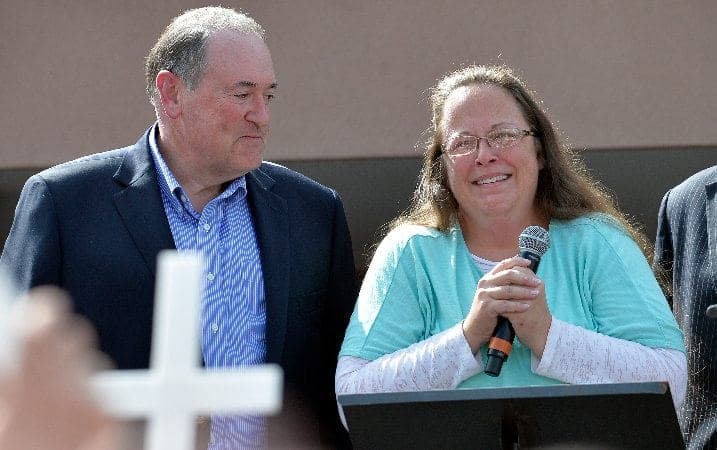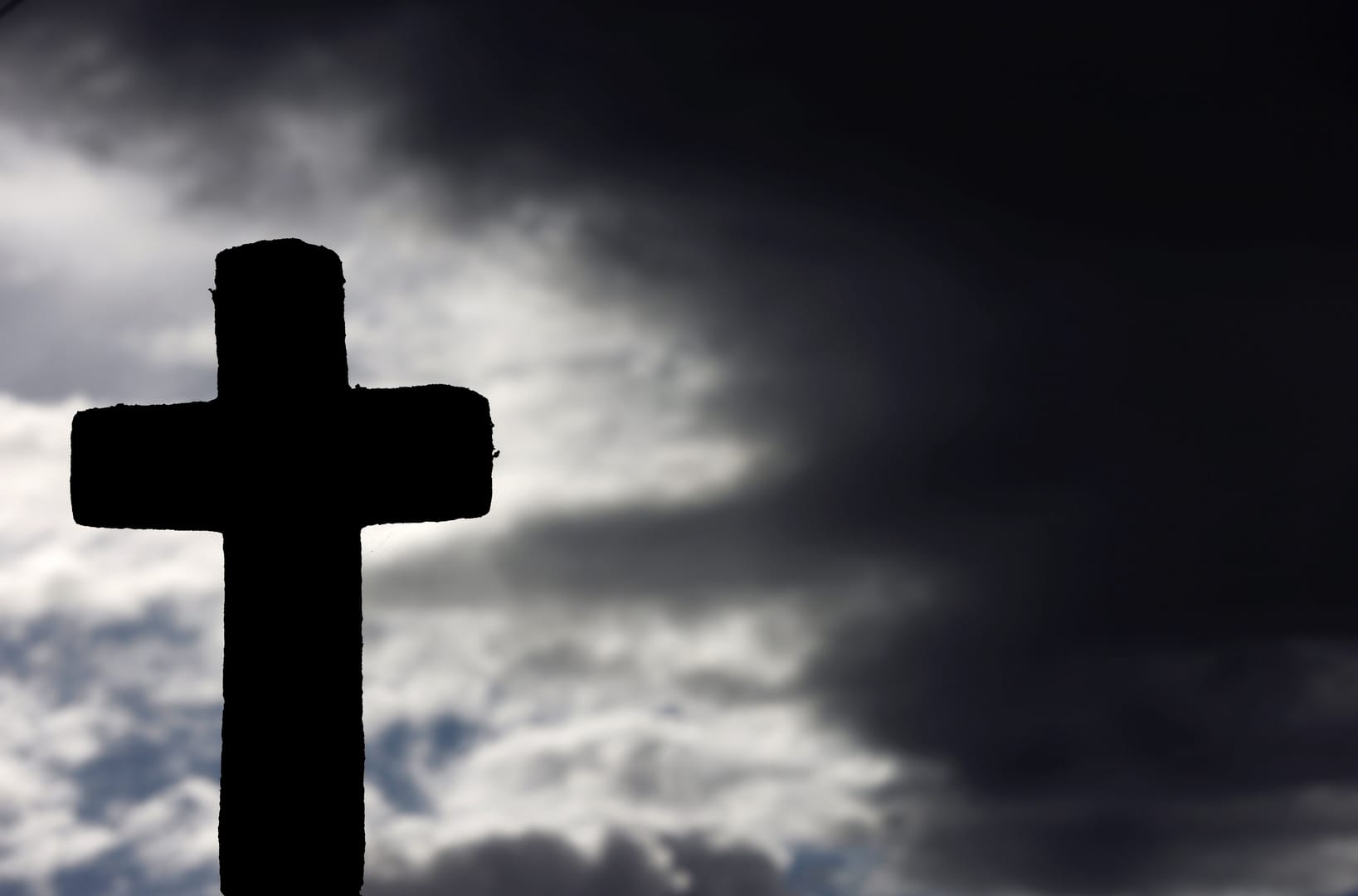ROME — Facing mounting controversy over a brief private meeting between Pope Francis and Kentucky court clerk Kim Davis last week, the Vatican broke its silence Friday with a statement saying the pontiff did not intend the encounter as a form of support for her case “in all its particular and complex aspects.”
Meanwhile, CNN reported — and the Vatican confirmed — that the day before Francis met Davis, he held a private meeting with a longtime friend and former student from Argentina who has been in a same-sex relationship for 19 years.
Davis, an Apostolic Christian, is the clerk who spent five days in jail in September for refusing to issue marriage licenses to same-sex couples, despite the US Supreme Court ruling in June that legalized gay marriage nationwide. The meeting with Davis was thus seen as the pontiff wading deeply into America’s culture wars.
The temptation to read the meeting as an endorsement of Davis was especially strong given comments made by the pope aboard the papal plane returning to Rome that conscientious objection on same-sex marriage, including for government officials, is a “human right.”
Davis and her lawyers also trumpeted the meeting as support for her cause. Earlier this week, Davis said that when she and her husband met the pope at the Vatican ambassador’s residence in Washington, DC, where the pontiff was staying, he encouraged her to “stay strong.”
She later told ABC: “Just knowing that the pope is on track with what we’re doing and agreeing, you know, it kind of validates everything.”
The Vatican statement Friday made clear the pope intended no such validation.
The Rev. Federico Lombardi, the Vatican spokesman, made it clear that Davis was one of several dozen people the pope greeted at the residence as he prepared to depart for New York City, and was not an “audience” with the pope.
“Such brief greetings occur on all papal visits and are due to the pope’s characteristic kindness and availability,” the statement read. “The only real audience granted by the pope at the nunciature was with one of his former students and his family.”
That student, according to CNN, was Yayo Grassi, an openly gay man who brought his partner, Iwan, as well as four friends to the Vatican embassy Sept. 23. A video of the meeting shows Grassi and Francis greeting each other with a warm hug.
Grassi, a caterer in Washington who said the pope taught him in literature and psychology classes at Inmaculada Concepcion high school in Flores, Argentina, from 1964-1965, told Crux he e-mailed one of the pope’s assistants about six months ago to ask for a meeting. About three weeks before the pope arrived in the United States, Grassi said, Francis called to say that yes, he would like to meet.
Grassi, who said he is not Catholic, said he decided to make his meeting public because he felt Davis was misrepresenting her encounter with the pope.
An audience differs from a meeting in that it is a planned, somewhat formal affair. Popes have audiences with heads of state. They have meetings and greeting sessions with benefactors or Catholic VIPs. So the fact that Lombardi described Grassi’s encounter as the only “real audience” in Washington made clear that Francis wanted to emphasize that encounter over Davis’ “brief meeting” with several dozen other people invited to the embassy at the same time.
As for the Davis meeting, the Vatican statement said that the pope “did not enter into the details of the situation of Mrs. Davis and his meeting with her should not be considered a form of support of her position in all of its particular and complex aspects.”
However, Davis’ attorney, Mat Staver, disputed the Vatican’s description and interpretation of the meeting. The Liberty Counsel released a statement early Friday that said the meeting was an affirmation of the Kentucky county clerk’s right to be a conscientious objector.
“We wouldn’t expect the pope to weigh in on the particulars of any case,” Staver said. “Rather, the meeting was a pastoral meeting to encourage Kim Davis in which Pope Francis thanked her for her courage and told her to ‘Stay strong.’ His words and actions support the universal human right to conscientious objection.”
John L. Allen Jr.: The Vatican must speak on conscientious objection
Staver said an unnamed Vatican official initiated the meeting on Sept. 14, the day Davis returned to work after being jailed, saying the pope wanted to meet her. He said Vatican security picked up her and her husband from their hotel and told her to change her hairdo so she wouldn’t be recognized since the Vatican wanted the meeting kept secret.
Staver said the couple was in a separate room with Francis and Vatican security and personnel, and that no member of the general public was present, to keep the meeting secret. He said the Vatican official who arranged the meeting insisted that it not be made public until after Francis had left the United States, and gave him the “green light” to make it public after Francis was back in Rome.
The dispute may center on what Staver means by the term “Vatican” and what the Church means.
The Rev. Thomas Rosica, who assists the Vatican with English-speaking media, seemed to indicate that the meeting had been arranged by Archbishop Carlo Maria Viganò, who serves as the pope’s ambassador in the United States.
“Everyone who was there was brought in by the nunciature, not the Vatican, not Lombardi, nor anyone of the Vatican’s group,” he said. “They were organized by the local people.”
Viganò is an Italian bishop best known for his role in the Vatileaks scandal, which helped bring about Pope Benedict XVI’s resignation: The scandal began in 2012 when an Italian journalist broadcast letters from Viganò, then the No. 2 Vatican administrator, to Benedict in which he begged not to be transferred for having exposed alleged corruption that cost the Holy See millions of euros. Viganò was eventually transferred to Washington to become ambassador.
He has since strongly taken up the religious liberty charge championed by US bishops, suggesting that he might well have supported Davis in her battle over gay marriage: In a 2012 speech to the University of Notre Dame, Viganò denounced threats to religious liberty in the United States and abroad, citing a public school curriculum presenting same-sex relations as “natural and wholesome.”
Francis has made clear he dislikes being used for political ends, and the Vatican’s statements appeared intended to make clear that the meeting with Davis should not be exploited.
Margery Eagan: Two views that Francis was duped
Francis firmly upholds Church teaching that marriage is between a man and a woman, but he did not focus on the debate over same-sex marriage during his visit, at one point telling the US bishops to avoid “harsh and divisive” language despite the challenges they face in society.
News of the meeting between the pope and Davis had sent shockwaves through the US Church, with Davis’ supporters saying it showed the pope backed her cause, and opponents questioning whether the pope had been duped into meeting with her and truly knew the details of her case.
Since news of the meeting was first reported on Tuesday by Inside the Vatican magazine, the Vatican had refused to comment — not denying the meeting, but declining to elaborate on how it happened or what it meant.
That changed Friday with the statement from Lombardi, which Rosica elaborated on later.
Rosica denied that anyone had attempted to manipulate the pope into meeting Davis, but said there had been a failure to advise the pope properly on the magnitude of the encounter.
“I don’t think anyone was willfully trying to trick the pope,” he said, “nor was the pope briefed properly on who he was meeting. He wasn’t properly briefed on the person or the impact of such visit.”
Rosica said he has heard the US bishops were not aware of the meeting, and suggested it may have been “orchestrated” by Davis’ legal team.
Rosica also said that Francis had personally approved issuing Friday’s statement after learning the reaction the encounter had generated.
“Lombardi called me this morning saying he’d just met with the pope, and that we had to send out the statement,” he said.
Grassi, the pope’s friend from Argentina, told Crux the “gay issue was not brought up, we just exchanged embraces and he asked how I was doing, how was my business. The meeting was a very personal one between two friends who haven’t seen each other in awhile.”
He told CNN that Francis has long known that he is gay, but has never condemned his sexuality or his same-sex relationship. Grassi said he and his partner Iwan (he declined to disclose his last name due to privacy concerns), who have been together for 19 years, also met Francis last year in Rome.
“He has never been judgmental,” Grassi said. “He has never said anything negative.”
“Obviously he is the pastor of the Church and he has to follow the Church’s teachings,” Grassi added. “But as a human being he understands all kinds of situations, and he is open to all kinds of people, including those with different sexual characteristics.”
National reporter Michael O’Loughlin contributed. Material from the Associated Press was used in this report.















